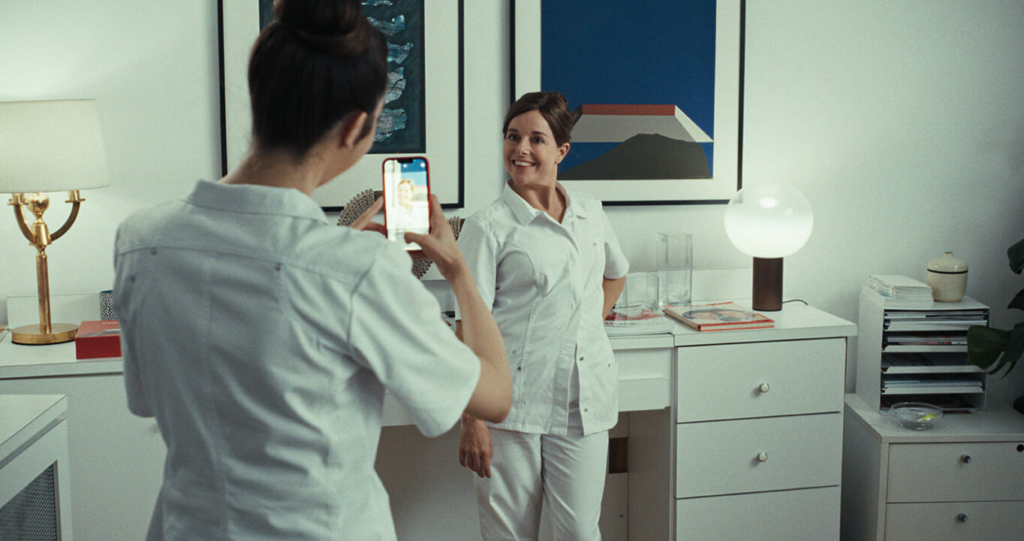Director: Caroline Vignal
Writers: Caroline Vignal, Noémie de Lapparent
Stars: Laure Calamy, Vincent Elbaz, Suzanne De Baecque
Synopsis: Iris, a woman who has everything: a wonderful husband, two perfect daughters, a successful business – but no sex life. When was the last time she made love? Perhaps the time has come to find a lover.
Four years ago, Gallic filmmaker Caroline Vignal made a big splash on the festival circuit with the delicate, warm-hearted relationship comedy Antoinette in the Cevennes. The film was an unexpected hit with French audiences, drawing in over 700,000 spectators and even picked up a César award. The Rohmer-inspired character piece offered viewers a rambling, picaresque snapshot of the disordered life of a vibrant schoolteacher engaged in a doomed affair with a married man. It was a light, airy affair that nonetheless captured the psychological nuances of its protagonist with remarkable precision. As a filmmaker, Vignal was uniquely receptive to the concerns and desires that drive people to enter into dysfunctional relationships that can’t be sustained in the long-term.

With her third feature, Iris et les Hommes (2023), she returns to the subject of marital infidelity but shifts her gaze from Antoinette, flighty, exuberant mistress, to Iris (Laure Calamy), a middle-aged dentist who is disappointed by the lack of passion in her marriage. This shift in focus is accompanied by the adoption of a darker tone and an attempt to tackle heavier subjects. We first witness Iris sinking into a mild depression as a result of her inability to achieve physical or emotional intimacy with her husband, Stéphane (Vincent Elbaz). He is sweet-natured and shows signs of being an attentive father, but Iris worries that the spark in their relationship is dead. While attending a parent-teacher meeting, she is introduced to a dating app by a fellow parent and soon finds herself communicating with a wide array of potential suitors. The app opens Iris up to a whole new world of possibilities and she begins to lean on it heavily as she battles a mid-life crisis of sorts.
One naturally wants to applaud a romantic comedy that throws so many different ideas up on screen. Much as I adore this genre, it is fair to acknowledge that it is often brought down by an over-reliance on formula and an unwillingness to make audiences uncomfortable. For every Ernst Lubitsch or Gregory La Cava, there are dozens of studio hacks with no interest in fully exploring some of the more challenging dimensions of stories about people falling in and out of love. Vignal doesn’t possess Lubitsch’s gift for biting class commentary or La Cava’s deft touch with ensemble casts but she is a talented behaviorist. Here, she takes a clear-eyed view of the inevitable acknowledgment that human beings and their motivations can be ultimately unknowable. You have to accept a certain lack of transparency within any relationship and live with the knowledge that any form of objective truth will forever elude you. She brings this mildly provocative thesis statement to the table and maintains a pleasingly ambiguous stance on the actions of the protagonist but one is still left with the feeling that the film as a whole doesn’t coalesce into anything substantial.

This feeling of mild dissatisfaction could be chalked up to the fact that the film never delivers any big laughs. The big comic set-pieces, including a song-and-dance number set to a French-language cover of The Weather Girls’s “It’s Raining Men,” are too overworked to be truly lively and spontaneous. Antoinette in the Cevennes has a ramshackle, thrown-together quality that heightens the comic effect of the gentle, word-play heavy jokes that are skilfully threaded throughout the narrative. Iris et les Hommes has a harder time handling tonal transitions; often lurching violently between being a heavy family drama and light sex farce. Unfortunately, when the jokes are delivered in such a labored manner, it doesn’t do much to ease the transition between the two separate strands of the plot.
If this doesn’t manage to build upon the achievements of Vignal’s sophomore outing in ways that are productive, it still provides evidence that she’s one of the more exciting filmmakers working in the romantic comedy genre today. There is something to be said for the fact that she’s legitimately fascinated by the ties that bind married couples together, even in the face of work-related burnout and the anxiety that tends to accompany parenthood. Her rich, evocative portraits of complicated women who make questionable choices fill an important niche within the realm of contemporary cinema.





